SAFARI CAMPS for responsible travellers
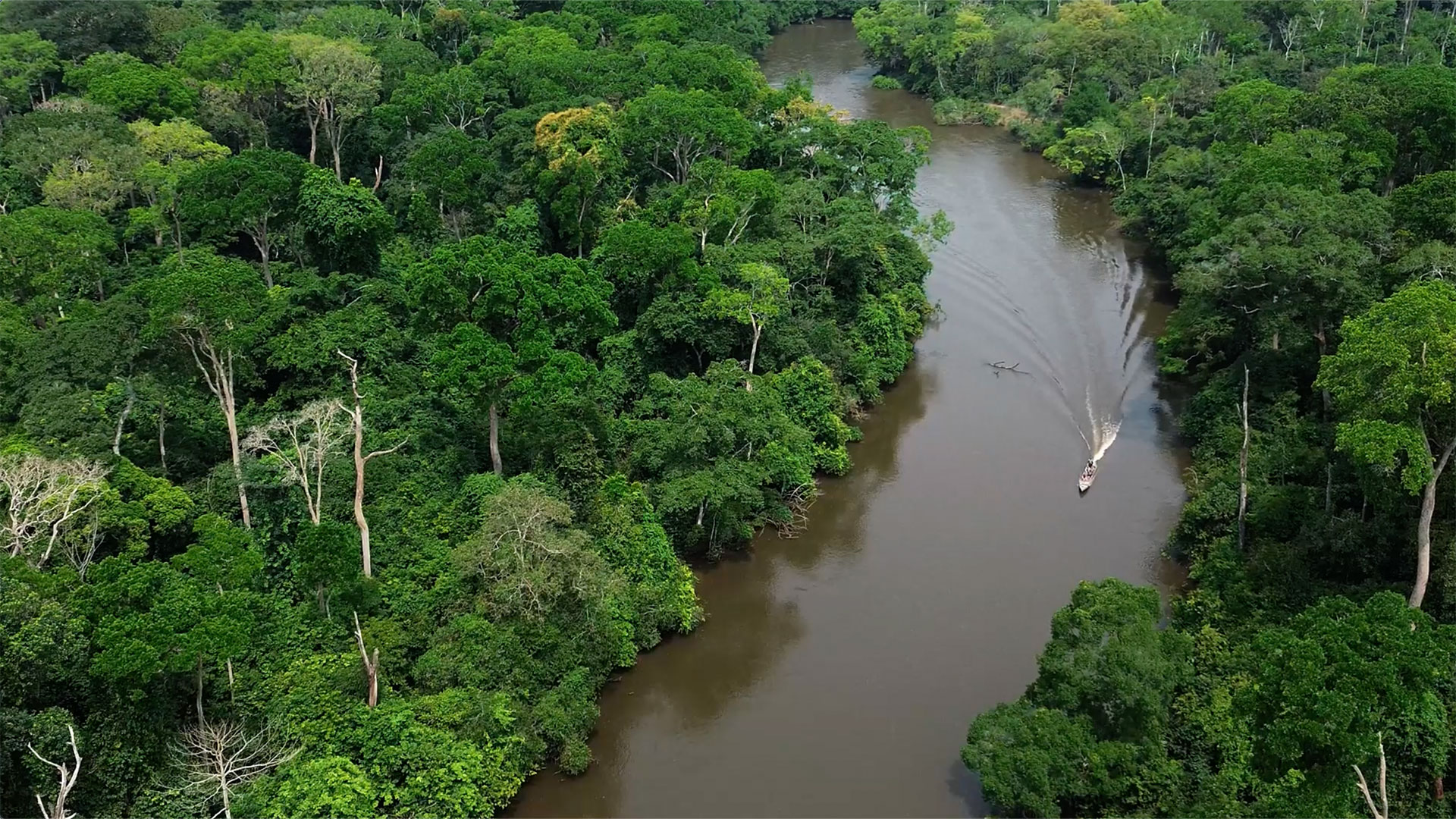
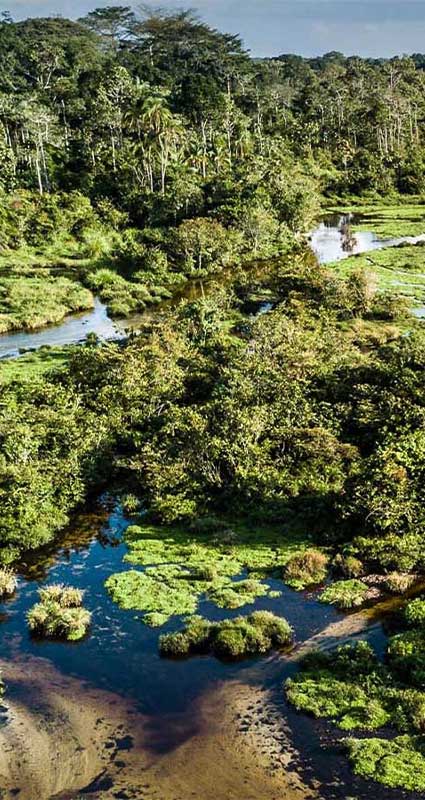
Odzala-Kokoua National Park
Congo-Brazzaville
An AFRICAN PARKS protected area
The preferred booking platform for lodges & bush camps that offer tangible, measurable benefits for conservation & communities
Western lowland gorillas, forest elephants, bongos, dwarf crocodiles, huge flocks of grey parrots & green pigeons - and much more.
Odzala-Kokoua National Park in the remote northwest of Congo-Brazzaville is covered in forests, rivers, marshes, and swamps that extend over 13,500 km2 (1.35 million hectares). It is an integral part of both the Congo Basin and the TRIDOM Transfrontier Park that overlaps Gabon, Congo and Cameroon.
The most distinctive characteristic of the Congo rainforest is the forest baïs - island clearings in the sea of trees. Here, marshy areas rich in minerals and salts attract a plethora of wildlife.
Odzala-Kokoua is one of Africa’s oldest national parks and the ideal destination for lowland gorilla watching.
🎥 WATCH THIS informative video about Odzala-Kokoua National Park
READ MORE about Odzala-Kokoua National Park (Africa Geographic)
Expert tip: Look out for the 'Forest five' (info below)
You will find no rim flow pools, air conditioning or wifi. A safari destination like no other - beyond the norm - from a bygone era ...
Information about Odzala-Kokoua
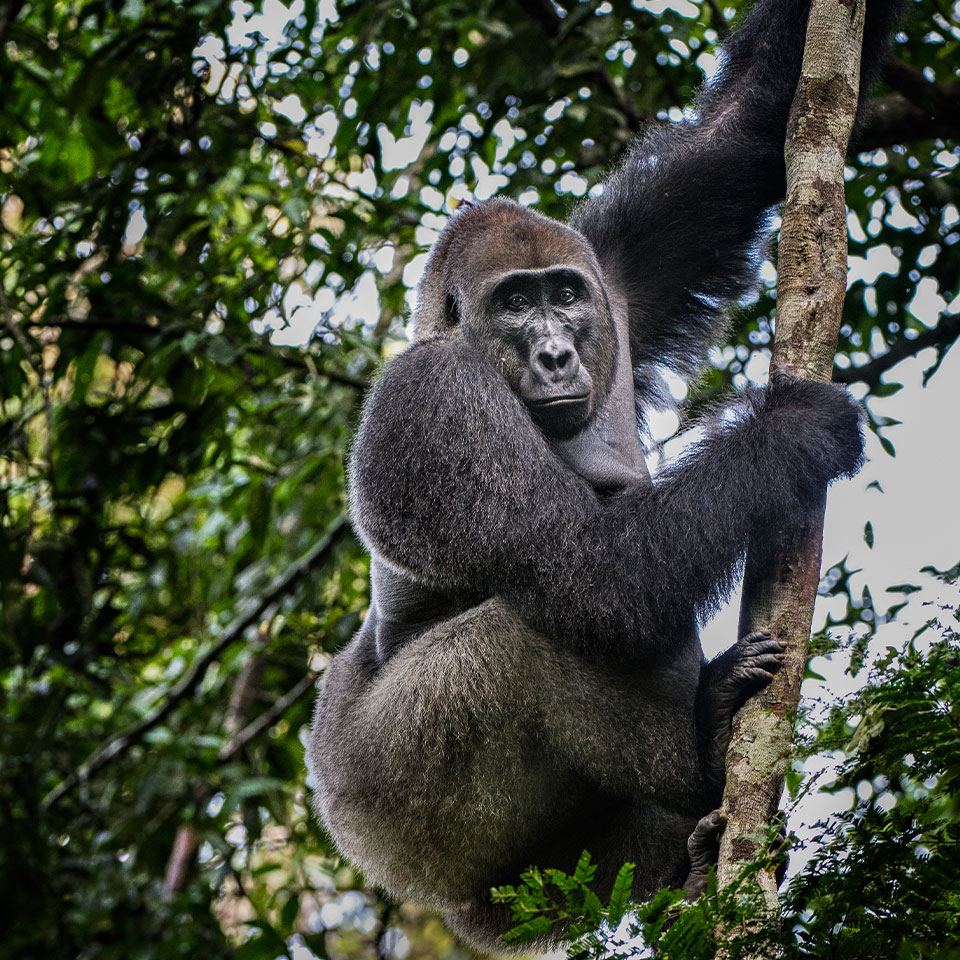
Odzala-Kokoua wildlife
Odzala-Kokoua offers huge biodiversity and species unavailable elsewhere - a truly unique wildlife safari. Scientists estimate that the forest is home to some 4,500 plant, over 100 mammal and over 440 bird species, including:
The 'forest 5' - western lowland gorilla, forest elephant, forest buffalo, bongo and giant forest hog.
Other primates such as common chimpanzee, Demidoff’s galago, grey-cheeked mangabey, moustached monkey, crowned monkey, agile mangabey, De Brazza’s monkey, putty-nosed monkey and Guereza colobus.
And then there are African golden cat, leopard, serval, spotted hyena, sitatunga, marsh mongoose, red river hog, palm civet, sitatunga, Congo clawless otter and various duiker species.
The bird species tally of over 440 includes delights such as Hartlaub's duck, Nkulengu rail, spot-breasted ibis, Congo serpent eagle, long-tailed hawk, vermiculated fishing owl, bare-cheeked trogon, white-crested hornbill, chocolate-backed kingfisher, lyre-tailed honeyguide, African piculet, grey parrot, African pitta, rufous-bellied helmetshrike and western bluebill
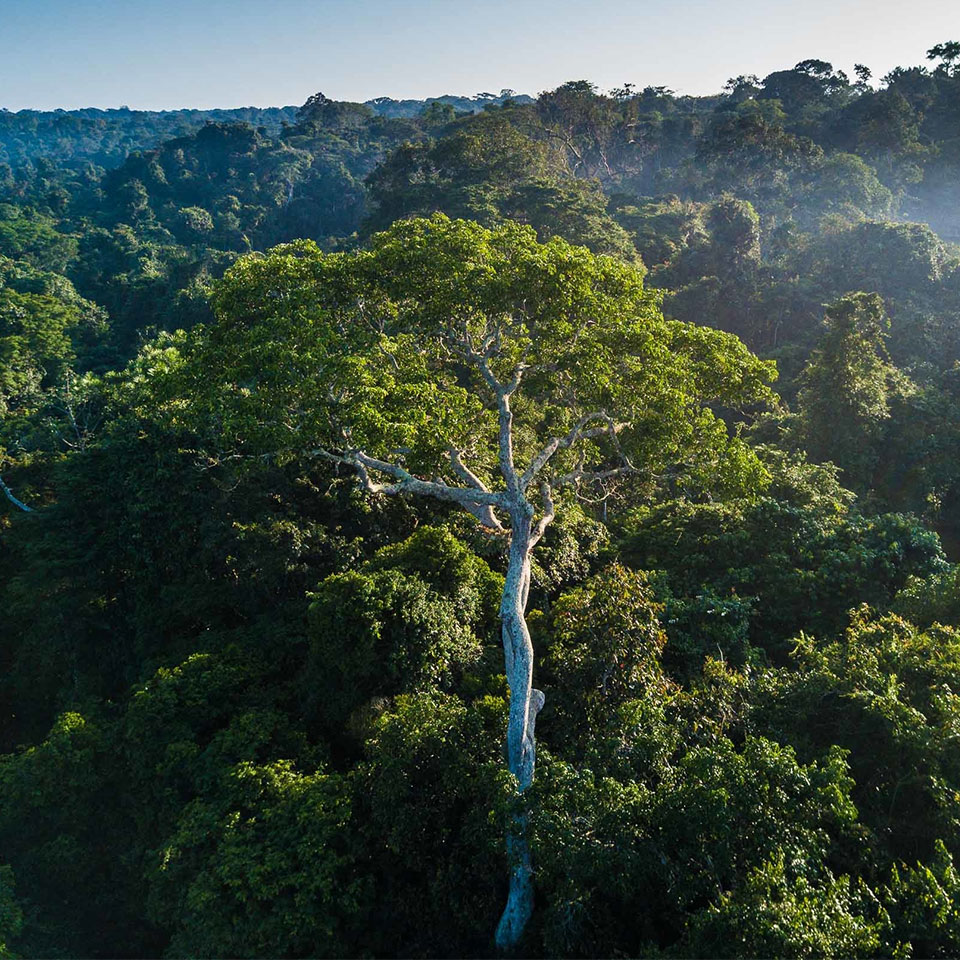
Odzala-Kokoua seasons & landscapes
Open all year round - Odzala-Kokoua animals do not migrate;
Congo-Brazzaville lies on the equator, meaning temperatures vary very little year-round. Average temperatures are usually 24-28 degrees Celsius;
Rain is a constant factor, but there are two main rainy seasons: from March to May and October to December.
The best months for wildlife viewing are the low rainfall months - June to September and January to February.
Odzala-Kokoua is about dense forests with open clearings (baïs) to open savannas. The northwest's dense forests open up into Marantaceae forest which gives way to gallery forests lining the floodplains of the more extensive waterways such as the Mambili and Lokoué Rivers. The dry savannas are dotted with enormous termite mounds that create an other-worldly atmosphere.
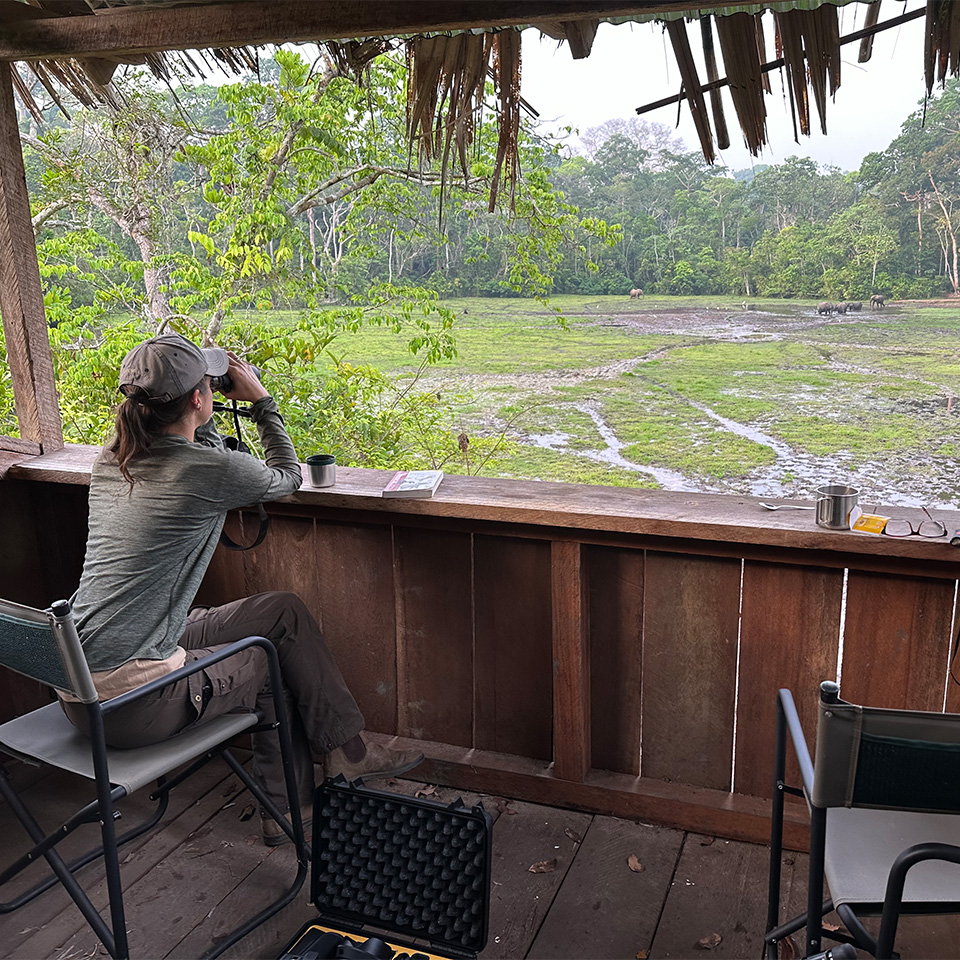
What to do in Odzala-Kokoua
visit baïs to view wildlife from an elevated covered tree house. A baï is a swampy clearing in the forest where wildlife gathers to drink and ingest mineral-rich soil. This is the best way to observe secretive species such as forest elephants, forest buffaloes, bongos, and gorillas.
a small baï near Camp Imbalanga is easily accessible via a 3-minute walk along a path and wooden walkway;
baïs further out can be visited during day trips, where you return to Camp Imbalanga on the same day;
bird watching and nature hikes - including spotting primates such as lowland gorillas, chimpanzees and many monkey species;
river cruises - to find birds, primates and crocodiles
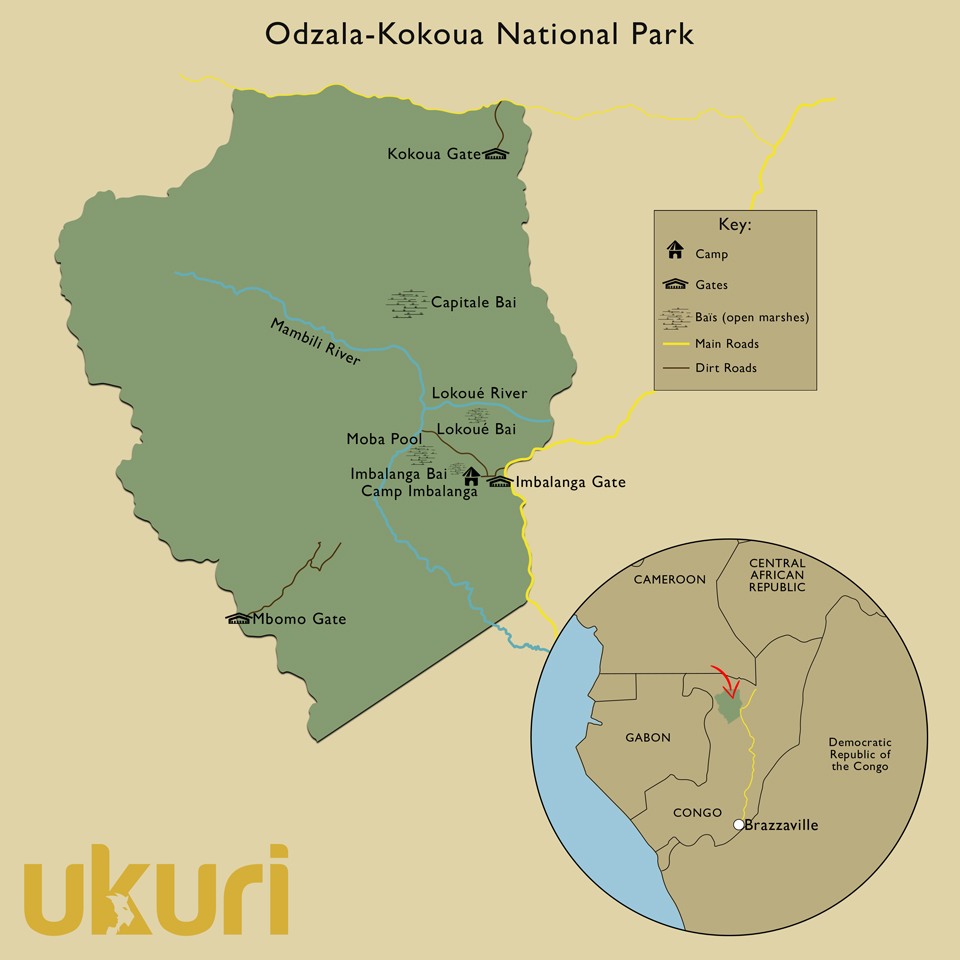
How to get to Odzala-Kokoua
Nearest airport city: Brazzaville.
By road: Camp Imbalanga is accessible via the park's east entrance (Imbalanga Gate), located close to Lango village. The tarred national road (N2) is in excellent condition, except for a few places where potholes exist. The 800km road transfer takes 9-10 hours from Brazzaville and is broken by a lunch stop in the town of Oyo, where you will find excellent coffee, pastries, and more substantial meals. It is not uncommon to see elephants and gorillas near the road during the last part of the journey, as the road skirts Odzala-Kokoua National Park.
Road transfers must be booked at the same time as Camp Imbalanga bookings. Please note that Ukuri does not arrange road transfers; clients or their travel agents must book them directly. The Ukuri team can, however, recommend preferred suppliers and provide relevant contact details.

Health essentials
Malaria area: Yes
Odzala-Kokoua is a malaria area. Please consult your travel doctor about malaria prophylaxis. In addition, take precautions to avoid being bitten - using insect repellents and wearing long sleeves and trousers in the evenings and mornings.
Yellow fever area: Yes
Congo-Brazzaville is a yellow fever area - please ensure that you have been vaccinated and have the necessary certificate. Please consult your travel doctor before travelling for relevant updates.
Tsetse flies: Yes
Tsetse flies can be a problem in certain parts of the park. Tsetse flies tend to be attracted to dark colours such as bright blue and black, so it is advisable that visitors wear khaki and lighter colours and make use of insect repellents.
Water
We advise against drinking tap water unless it is boiled or filtered. Bottled water is widely available in Congo-Brazzavile. Bring your own refillable water bottle to fill up as you go.
Medical emergencies
Odzala-Kokoua is a remote area - please ensure you have evacuation insurance in case of medical emergencies. African Parks utilises the following emergency evacuation service: SATIB24.
✔️ Vested communities ✔️ Responsible & sustainable
100% of tourism revenue earned by African Parks goes to conservation and local communities
Your safari to Odzala-Kokoua National Park will make a difference for local people
Visiting the African Parks camps in Odzala-Kokoua is the most direct way to support local communities because these camps help boost:
community engagement with park management via small teams in each village consisting of women, elderly and youths;
village development is voted on and managed by local people and funded via tourism revenues, carbon agreements and natural resource management;
health is enhanced via mobile clinics;
jobs and income generation via agriculture, artisanal crafts and sustainable exploitation of natural resources - to develop opportunities away from hunting and other harmful activities;
conservation education of more than 1,000 children from school environmental clubs who have visited the park.
READ ABOUT African Parks community-based projects at Odzala-Kokoua
Your stay at Odzala-Kokoua will help conservation
In 2010, African Parks entered into a 25-year-long agreement with Congo-Brazzaville’s Ministry of Forest Economy, Sustainable Development and Environment to protect this globally significant park. Subsequently included in the agreement is Lossi, a 380 km2 area situated to the southwest of Odzala-Kokoua.
While bushmeat poaching remains a constant threat, law enforcement, coupled with education and conservation-based community enterprise opportunities, has stabilised illegal activity within the park. The park surveys indicate stable populations of key wildlife species: forest elephants and western lowland gorillas.
Odzala-Kokoua-Lossi is now in safe hands, and your visit to Camp Imbalanga as a responsible traveller helps to protect this vital ecosystem.
READ ABOUT
Information about Congo-Brazzaville
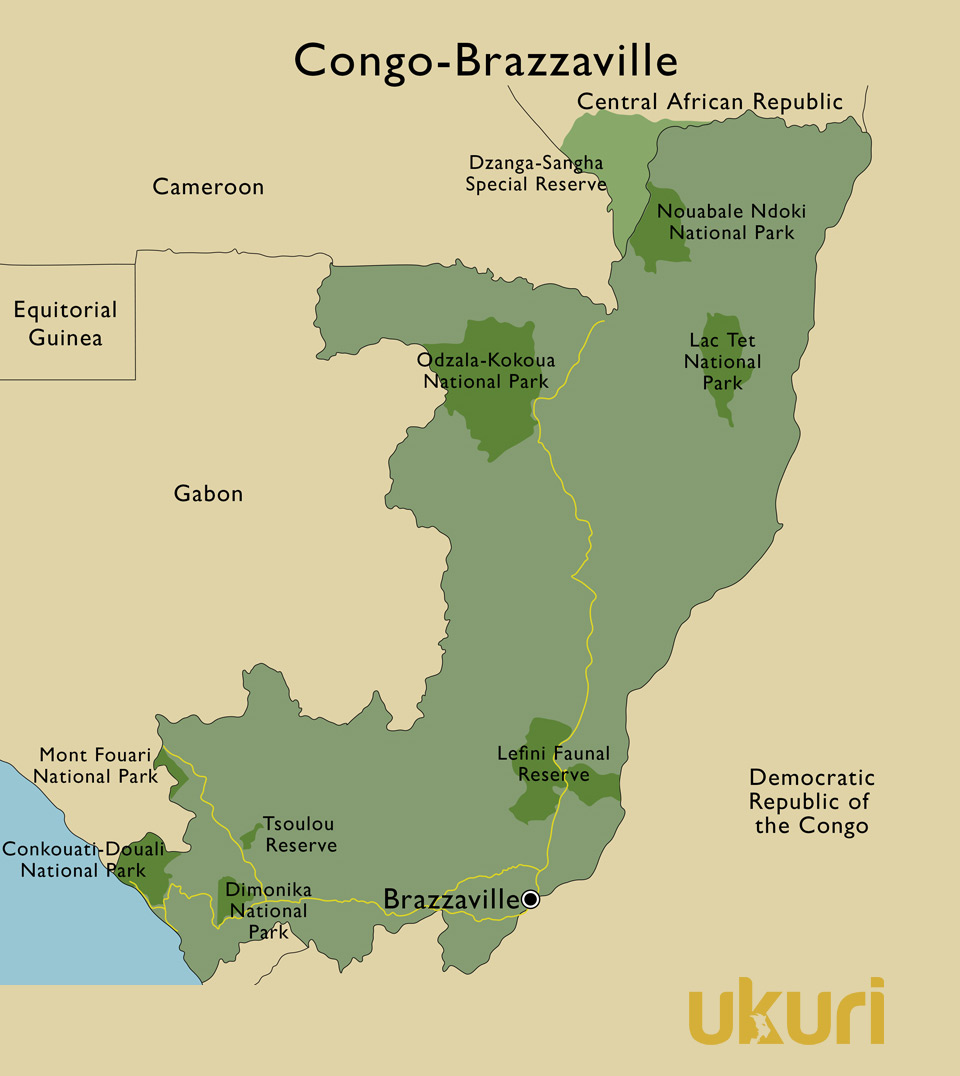
Key Congo-Brazzaville facts + map
Capital city + tourist hubs Brazzaville + Pointe-Noire.
Languages French, Kituba and Lingala.
Time zone GMT + 1 hours.
Currency & payments Central African (CFA) Franc. The local currency is preferred for transacting - very few shops use credit card machines, and even fewer accept foreign currency. Draw local currency from cash dispensers (ATMs) or visit an exchange bureau in Brazzaville. ATMs are available at major banks, with Visa being the preferred card, but MasterCard may also be used at certain banks. Ensure you carry small change whenever possible, as there is often no change available and notes bigger than XAF 2,000 can be hard to break (especially if using taxis).
Visas Enter your details here for visa and other requirements.
Plugs Plug types are C (two small round pins), D (three round pins) & E (two round pins and a hole for the socket's male earthing pin).
Mobile phones Prepaid SIM cards can be purchased in Brazzaville. Phone and internet coverage outside of major cities is poor.
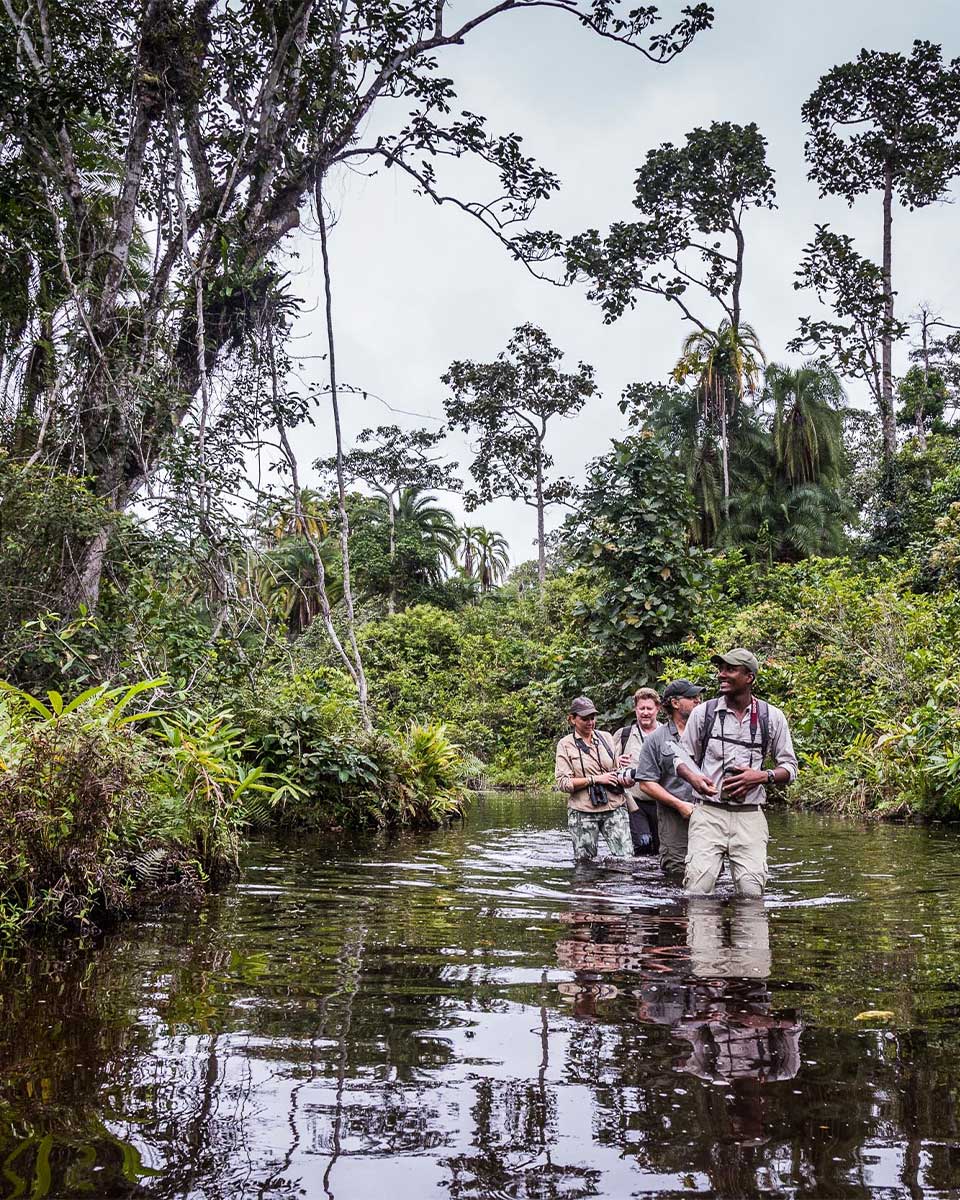
Congo-Brazzaville travel highlights
Brazzaville
Capital city Brazzaville is home to a vibrant arts and culture scene, bustling markets, and some fascinating relics of colonial times. Located on the banks of the Congo River, the city enjoys clear views of Kinshasa (DRC) across the water.
Odzala-Kokoua National Park
Odzala-Kokoua is one of Africa’s oldest national parks and the ideal destination for lowland gorilla watching. This vast protected area of forests, rivers, marshes, and swamps is an integral part of the Congo Basin that overlaps Gabon, Congo and Cameroon.
Nouabalé-Ndoki National Park
Nouabalé-Ndoki National Park in northern Congo-Brazzavile is an intact lowland rainforest that has never been logged, contains no roads, and protects wildlife that has no contact with people.
Pointe-Noire
Pointe Noire, on the Atlantic Ocean coast, is the second-largest city in Congo-Brazzaville. The city has a seaside atmosphere with idyllic palm-fringed beaches extending from north to south of the region.
Conkouati-Douli National Park
This Atlantic Coast national park is the country's most diverse - offering beaches, lagoons, savannahs, forests and mountains. The park hosts a diverse range of wildlife, including marine and forest species.